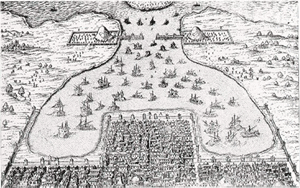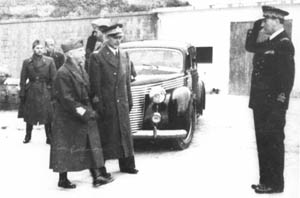 BRINDISI THROUGH THE HISTORY
BRINDISI THROUGH THE HISTORY
The city’s name
derives from Brunda meaning, “The Head of a Deer”,
inspired by the shape of Brindisi’s natural harbour.
Its splendour came during the Roman Age.
In 267 BC The Romans conquered the city, creating a
colony and lengthening Via Appia leading to the port,
which from then on became one of the principalities
of Italy. They constructed temples, baths, the amphitheater,
the mint and aqueducts.
From 58 to 48 BC Cicero visited the city on a regular
basis, were he was friendly received. During this period
of time, hard battles were fought between Pompeius and
Caesar who were both aiming to supremacy.
On 19th September 19 BC, poet Virgil, who wrote verses
of Aeneas, died at his home in Brindisi which was located
in the area of the Roman Columns (photo).

Caesar's besiege to Pompeius.
Palladio - 1619
With the fall of the
Roman empire, the city of Brindisi falled and was dominated
by Goths, Ostrogoths and Greek Byzantines. Greek Byzantines
ruled even through the Saracines and Longobard invasions,
up until the arrival of the Normans around 1070.
After the Normans, the Swabians followed, led by emperor
Frederick II (1221); the Town was re-launched in its
role of main departure point to East during the age
of the Crusaders (1096-1291 -
more info). In 1268
the swabians were followed by the Angevin. Then, after
the domination of the Aragoneses and the Venecianes,
the Spanish returned.
After the Austrian rule in 1707-1734, the city of Brindisi
went through Bourbon rule in 1759.
With the opening of the Suez Canal in 1869, the Indian
Mail Route, a British shipping operation, estabilished
a naval link with routes from Brindisi to Bombay and
back (more
info).

The king Vittorio Emanuele III
arrived in Brindisi
During the 1st World
War, Brindisi was bombed approximately thirty times
by enemy forces; from its port, Italian naval ships
and submarines left for 207 missions of war; so, the
Military Cross of Honor was brought to the city.
During the Fascist era there was great interest from
Mussolini, to upgrade the port, as well as the city.
Also during the 2nd World War Brindisi was subject of
aerial attacks from its enemies, suffering great structural
and housing damage.
On the 10th September 1943, King Vittorio Emanuele III
with his Queen disembarked and, up until February 1944,
Brindisi was capital of Italy (more
info).
Nowadays, approximately
100 thousand inhabitants live in Brindisi.
«
Back
|

